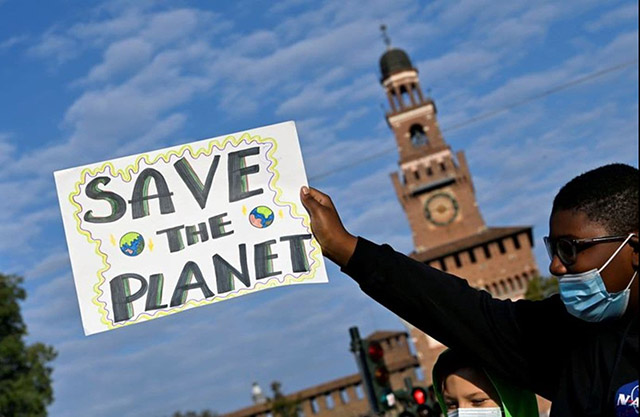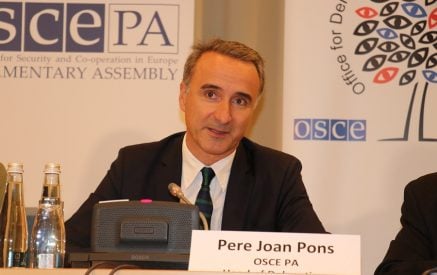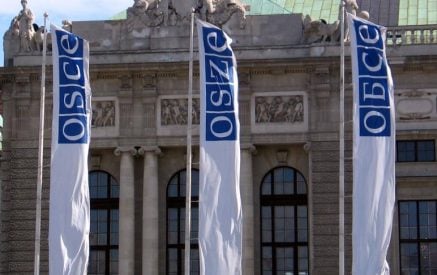By Pere Joan Pons, Chair of the OSCE PA’s General Committee on Economic Affairs, Science, Technology and Environment
The COP26 may be over, but the hard work of substantially reducing greenhouse gases and effectively addressing the climate crisis is just getting started.
In Glasgow, the nations of the world agreed to reduce the emissions that cause global heating, in a deal that goes further than any previous international agreement on climate. There were some disappointments, such as a last-minute change to water down language on coal, but on the whole it was a modest step forward in our collective efforts to avert the worst effects of climate change.
As Chair of the OSCE Parliamentary Assembly’s economic and environmental committee, I welcome the outcomes of the summit, and am particularly pleased with the surprise joint statement issued by the United States and China last week about “enhancing climate action in the 2020s.” It is crucial that the world’s biggest CO2 emitters work together on tackling this challenge despite political disagreements they may have on other matters. There can be no global security without climate security and multilateralism is the only way forward.
Read also
But while somewhat encouraged, at the same I can’t help but temper my enthusiasm with the knowledge that for decades, world leaders have been gathering and adopting climate pledges only to see greenhouse gas emissions continue to rise year after year – along, of course, with global temperatures.
As youth climate activists have pointed out, we have seen many ambitious agreements fail to produce the necessary results, and despite the new commitments of the Glasgow agreement, many scientists warn that it probably does not go far enough to keep the world from exceeding 1.5 degrees Celsius rise over pre-industrial levels.
It should also be appreciated that with global temperatures having already increased about 1 degree Celsius since the Industrial Revolution, we are currently seeing catastrophic impacts in terms of extreme weather, drought, flooding, and ocean acidification. With this in mind, the 1.5 degree target should be seen not as a goal, nor the Glasgow agreement as a great victory, but as a stopgap solution as we transition to a carbon-free economy.
When it comes to the climate crisis, one of the difficulties we have grappled with over the past several decades is a fundamentally human-level challenge of balancing a sense of urgency over the crisis with optimism for the future. We have struggled to acknowledge the realities of the situation without falling into alarmism and despair, or alternatively, to pretend the problem doesn’t exist.
It has been equally difficult politically for countries to forge agreements that could impact their economies and to balance ambition about climate action with realism about fundamental economic principles. In a global economy built on the use of fossil fuels, the challenge is finding the right balance of maintaining economic growth while pursuing a cleaner and safer future for our environment.
Unfortunately, this balancing act is no longer tenable. We see the effects of global heating all around us and it appears all too obvious that the uninhabitable earth that scientists have warned about could become our shared, nightmarish reality.
And although some exciting developments in alternative sources of energy offer new possibilities in making the transition to a green economy, it seems that the planet’s climate system is growing impatient with us. Despite the diplomatic skills of international negotiators at climate summits, it is becoming all too clear that the toughest negotiator of all is Mother Nature. The extreme weather we routinely face is all the proof we need that the transition is taking far too long.
This is why, as stated in a “Parliamentary Plea for Resolute Climate Action” that I issued with several of my OSCE PA colleagues halfway through the Glasgow summit, national leaders must put short-sighted interests aside and take decisive action to mitigate and adapt to the crisis and protect the people. Along with Committee Vice-Chair Artur Gerasymov, Rapporteur Gudrun Kugler, Special Representative on Arctic Issues Bryndis Haraldsdottir, and Special Representative on Sustainable Development Goals Askar Shakirov, I urgently call for:
- drastic reductions in emissions of greenhouse gasses,
- development of effective adaptation strategies,
- mobilization of the necessary financial resources and
- international collaboration across the board.
Our Parliamentary Plea underscores that economic growth and protecting the environment are not mutually exclusive, stressing the need to utilize the best available science and accelerate technological innovation for the common good of the planet and all people living on it. In this complex but absolutely needed socio-economic-cultural transition process, we must consider those who are most vulnerable to the impacts of climate change and leave nobody behind. Instead, everyone should be brought on board for the required socio-economic transformations, starting with youth, but also including labor, industry, local governments, and civil society.
Ultimately, we must urgently rebalance our development model to make it more carbon neutral, fair and sustainable. This implies tough decisions and a shared vision for action, decisions that our leaders are called to make now, in particular by prioritizing green energy technologies and sharply reducing public subsidies to the fossil fuel industry.
But while taking bold steps toward a carbon-free future, we also should acknowledge that it may be too late to prevent some of the impacts of climate change and immediately start taking adaptation measures such as enhancing early warning systems and improving disaster preparedness and response.
As parliamentarians, we must embrace our shared role in addressing this crisis, including by adopting relevant legislation and mobilizing adequate resources. It is also crucial that we engage with the public on this issue and hold our governments accountable. The OSCE Parliamentary Assembly, consisting of 323 members of parliament representing over one billion citizens, can play a key role in catalyzing security at all levels.
At the end of the day, it is up to all of us to ensure that the promises made in Glasgow are kept. It is now or never.
Pere Joan Pons is a Member of Parliament from Spain.


























































